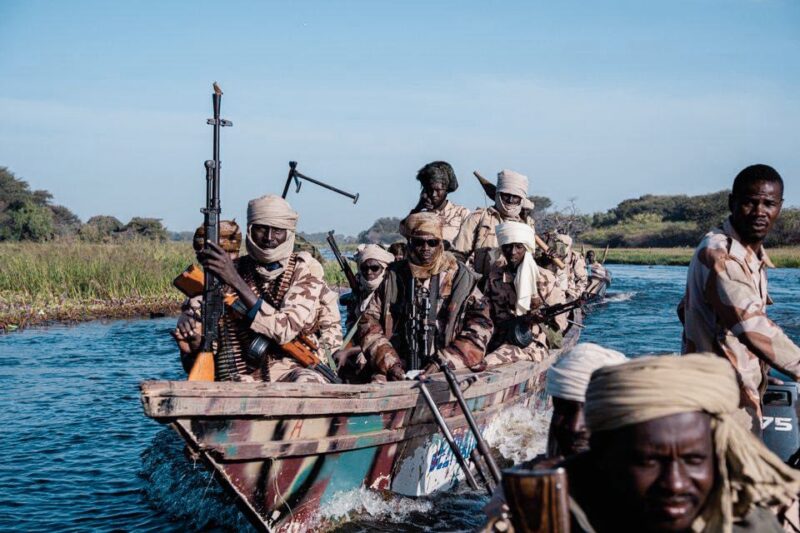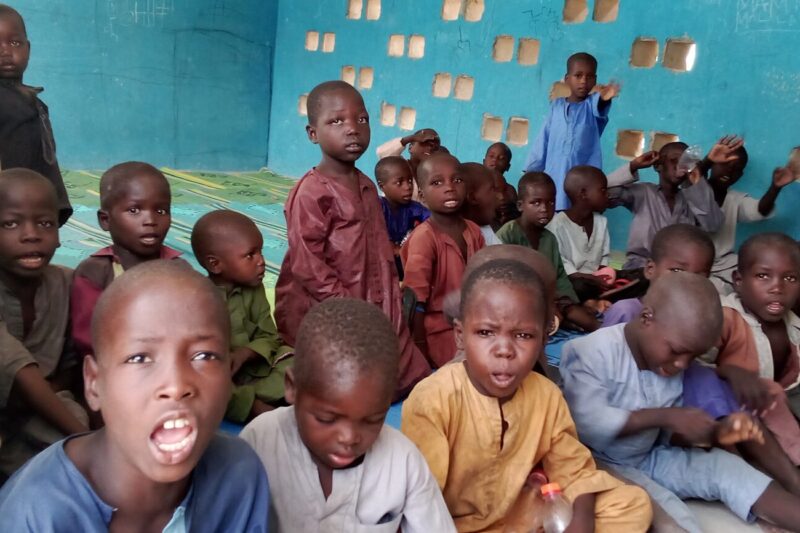Inhabitants of Lake Chad region fear reprisal attacks as insurgents flee from counterinsurgency operations, leaving their weapons and other possessions behind them.
At least 17 Chadian soldiers have been killed and 32 others wounded in clashes on the shores of Lake Chad between the army and insurgents.
Speaking on national television, General Issakh Acheikh said on Sunday that 96 insurgents were “neutralised” and 11 severely wounded in clashes on Saturday, November 9.
He did not give the exact location. Nor was it clear whether the insurgents were members of the Jamā’at Ahl as-Sunnah lid-Da’way Wa’l-Jihād (JAS), more commonly referred to as Boko Haram, or the Islamic State West Africa Province (ISWAP).
“The army assures the population that the situation is under control and that actions to track down residual elements continue as part of Operation Haskanite,” Acheikh said, adding that the forces had seized 107 individual weapons as well as a number of what he described as “collective” weapons.
“Troops destroyed six canoes used by the Boko Haram for movement and attacks. Apart from the 96 killed, 11 terrorists were severely wounded in the confrontation,” he said.
“Tragically, 17 Chadian soldiers lost their lives, while 32 others sustained injuries and have been evacuated to N’Djamena for urgent medical attention and proper treatment.”
The clashes on Saturday were in response to an attack on a military base in Ngouboua, a village on the island of Bakaram in the Lake Chad region. Forty Chadian soldiers died in the attack on October 28.
At least 200 soldiers were thought to be based at the garrison at the time of the attack. Insurgents reportedly seized ammunition and equipment before they left.
Chad’s President Mahamat Idiss Déby visited the site of the attack the following day to assess the situation on the ground, pay his respects to the deceased soldiers, show his compassion to the wounded and lift the morale of his “brothers-in-arms”.
Inhabitants of local government areas of Borno State – in Nigeria’s northeast – said they were astounded to see scores of insurgents fleeing from the shores of Lake Chad.
“They are moving out of their enclaves due to intensified air and ground operations conducted by members of the Multinational Joint Taskforce [MNJTF],” said Awa Sulum (not his real name), a resident of the Mobbar Local Government Area in the northern part of Borno State.
“Some of them are fleeing in vehicles and on motorbikes; others are running or walking, most of them barefooted.
“We have seen the insurgents leaving their hideouts. Most of them are coming from the Kukawa Local Government Area and crossing into communities such as Gashayar and Ngarmu in Malam Fatori town, the headquarters of the Abadam Local Government Area which borders Damasak town, the headquarters of Mobbar,” said Sulum.
“Right now, most of the people from the agrarian communities between the Mobbar and Abadam local government areas have also fled, leaving behind their hard-earned properties, houses, livestock and farmlands. Everyone is frightened of reprisal attacks by the insurgents who are on the run and looking for a safe place to hide from the military.
“We fear anything could happen,” Sulum said.
“The insurgents have taken a heavy beating from the military. We have seen them fleeing, even leaving behind their weapons and other possessions.
“This is the right time for the Nigerian military to wipe out the remnants once and for all – there are not too many of them left.”
Mamman Shettima, a security analyst based in Maiduguri, the capital of Borno State, told RNI that the fleeing insurgents were a menace and problem to not only Nigeria but also to the neighbouring countries of Chad, Cameroon and the Niger Republic.
“That is why there should be a strong security presence in the Lake Chad region – and intensified counterinsurgency operations.”
Shettima said there were rumours that the Chadian military had threatened to leave the MNJTF after last month’s attack on its soldiers.
Chad’s President Mahamat Idiss Déby was quoted as saying his country would pull out of the MNJTF of the Lake Chad Basin Commission, which has about 11,000 troops, because of the absence of what he called coordinated efforts among troops belonging to member states in jointly fighting JAS and ISWAP “terrorism”.
Déby was said to be disgruntled because Chad was not receiving the assistance it needed to track and eliminate insurgents.
Déby’s threat to withdraw his troops came after reports that the central African state’s military mistakenly killed fishermen on Tilma island in a massive counterinsurgency airstrike on the Nigerian side of Lake Chad on Wednesday, October 30.
Chad’s government denied reports that its fighter jets bombed the fishermen, saying they were unfounded.
“It is imperative for the Nigerian government to put in place all the necessary measures to stop the fleeing insurgents from taking over resettled communities and displacing inhabitants as they did before,” said Shettima.
“It’s evident that most of the communities in the Mobbar, Abadam and Kukawa local government areas, among others, have been successfully resettled by the Borno State government. The returnees have started picking pieces of their lives after years of displacement. Farming and business activities are gradually beginning to boom amid relative peace and security.
“But the government must stop the fleeing insurgents from regrouping. They must not be allowed to attack and displace the resettled agrarian communities in the northern part of the Nigeria again.”
Shettima said the massive onslaught by Chadian soldiers – as well as intensified counterinsurgency operations conducted by the Nigerian military – had diminished the power of insurgents to such an extent that they were on the run, leaving their hideouts in the Lake Chad region.
“Now is the time for proactive security measures, formidable synergy and strong military cooperation between the countries of Nigeria, Chad, Cameroon and the Niger Republic to counter the fleeing insurgents from all angles and finish off the remnants forever.”
The Nigerian Air Force (NAF) has reported that at least 70 ISWAP insurgents were killed in airstrikes on Kwallaram and Arianna Ciki in Borno State.
Major-General Edward Buba, director of defence media operations, said in a statement released on Saturday, November 9, that the NAF had conducted several airstrikes on Wednesday, November 6.
He said in the past week, troops on operations across the country neutralised 169 insurgents and arrested 641 criminals.
SHETTIMA LAWAN MONGUNO








